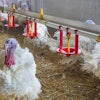
The U.S. government's mandates and subsidies favoring corn-based ethanol were hot topics for executives participating in a panel discussion at the NCC annual convention. "When Congress comes back after the election, I think it is imperative for each and every one of us to work extremely hard and somehow halt these mandates," said Richard Bond, president and CEO, Tyson Foods Inc.
"We need to get these mandates rolled back or get them moved to cellulosic ethanol and away from corn. If something were to happen to a crop, and instead of 13 billion (bushels of corn) we had 8 or 9 billion (bushels of corn), and we have over half of that going into ethanol, we would have a real problem trying to feed the poultry and livestock that we need to feed this country, and the rest of the world."
Ethanol the biggest challenge
Clint Rivers, president and CEO, Pilgrim's Pride Corp., said, "Ethanol has been a huge challenge for our industry. If you had told me a few years ago that we would have an energy policy that would take our major food crop and use 50% of it to produce energy, I would have told you that you were crazy. But, that is where we are today."
The corn-based ethanol mandate is scheduled to increase to 15 billion gallons in a few years and this may use over half of the U.S. corn crop, according to Rivers. He said that all crop prices are affected because the mandate for corn use and the subsidies create a demand for acres and this raises prices for all crops.
Rivers explained that in order for USDA's projections to work out so that ethanol production "only" uses 40% of the corn crop, corn yields will have to improve at a greater pace than they have. Since 2000, yield increases have only provided half of the corn needed to produce the additional ethanol that has been mandated.
Rivers said that he had attended a meeting early this year where he saw the potential for $8 per bushel corn, and of course, we know what happened later.
So, at the NCC annual meeting in October, he jokingly predicted a drop in corn prices to $4 per bushel.
Rivers said that both major presidential candidates are talking about taking another look at the corn-based ethanol program and subsidies. Rivers said that it is crucial that government policies regarding subsidies and mandates for corn-based ethanol change.
Bond echoed this sentiment and said, "Ethanol mandates are killing us. We need to do something as soon as Congress comes back after the elections."
Industry structure changing
Jim Perdue, chairman, Perdue Farms, said that broiler industry consolidation in the U.S. will continue. He said that the top three companies will process 75% of the industry's total within 10 years, up from 50.9% last year.
Perdue said that there will be more multi-species companies, more U.S. ownership of foreign production and more foreign ownership of U.S.production.
Bond commented that global expansion is one of Tyson's four core strategies. Perdue said regulation, like California Proposition 2 which calls for the banning of cages for laying hens, will ultimately force some poultry production overseas.
Perdue said that the retail environment for food will be more fragmented in the future than today. Food sales have been moving away from traditional grocery stores and towards super centers and more convenient food selling outlets like C-stores. Within food retailing segments, like traditional grocery stores, consolidation will continue. Food service distributors will also continue to consolidate.
Because of this consolidation, he predicted that there will be more processing plants dedicated to producing specifically for large retailers and/or food service accounts. He also said that these large retailers will continue to demand private label poultry and this will put more pressure on the brands of poultry processors.
Perdue said that green packaging is not a fad, it is a real movement, and it will drive the business. Sustainability is important to poultry industry customers, so it will be important for the poultry industry.
Future of exports
Joe Sanderson, chairman and CEO, Sanderson Farms, said, "Obstacles to access to foreign markets is always political and never economic in nature."
He explained that the prospects for U.S. exports are still good even with the potential for a drop in exports to Russia. He said that continued economic growth in emerging markets like China and India will continue to provide opportunities for U.S. poultry companies.
U.S. broiler producers are also benefiting from relative cost parity with Brazilian producers that they enjoy today, according to Sanderson. Some of this competitiveness has come from the relative weakness of the U.S. dollar versus the Brazilian real. He said that the exchange rate between the two currencies is not expected to swing back in favor of the dollar in the near term.
Sanderson said that producers need to be cognizant of the effect that higher prices of chicken will have on consumer demand, once the grain-price increases actually reach the consumer.
But, he thinks that chicken's better feed conversion and lower cost compared to other meats will help chicken compete successfully in this new environment.


















